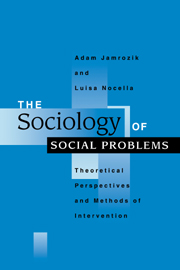Book contents
- Frontmatter
- Contents
- List of Tables
- List of Figures
- Preface and Acknowledgements
- 1 Introduction: Theoretical Perspectives on Social Problems
- 2 Contemporary Perspectives on Social Problems
- 3 Methods of Intervention in Social Problems
- 4 Social Actors in Social Problems
- 5 Challenges of Contemporary Social Problems
- 6 Social Problems in the Residualist Conversion Perspective
- 7 Inequality – The Underlying Universal Issue in Social Problems
- 8 The Social Construction of Family Problems
- 9 The Problem of Social Order
- 10 The Theory of Residualist Conversion: Does it Meet the Test?
- 11 Conclusions and Implications
- Bibliography
- Index
Preface and Acknowledgements
Published online by Cambridge University Press: 29 March 2011
- Frontmatter
- Contents
- List of Tables
- List of Figures
- Preface and Acknowledgements
- 1 Introduction: Theoretical Perspectives on Social Problems
- 2 Contemporary Perspectives on Social Problems
- 3 Methods of Intervention in Social Problems
- 4 Social Actors in Social Problems
- 5 Challenges of Contemporary Social Problems
- 6 Social Problems in the Residualist Conversion Perspective
- 7 Inequality – The Underlying Universal Issue in Social Problems
- 8 The Social Construction of Family Problems
- 9 The Problem of Social Order
- 10 The Theory of Residualist Conversion: Does it Meet the Test?
- 11 Conclusions and Implications
- Bibliography
- Index
Summary
Social problems are integral to our daily living. Some social problems emerge unexpectedly, and disappear equally fast from our concerns. Other problems acquire a perennial quality. Unemployment, poverty, urban traffic congestion are on our minds and on our television screens. Social problems are of concern to sociologists, social workers, politicians, and, at one time or another, to all of us. They are studied, remedied, sometimes even solved; often they are forgotten because they do not affect us personally. Nevertheless, social problems are always with us.
This book is about the sociology of social problems. It examines how social problems emerge, who is concerned about them, who is threatened by them, and how societies attempt to solve them, attenuate them or perhaps ignore them. This is a theoretical book. The text is based on a theoretical framework that we have developed to enable us to systematically analyse social problems as social phenomena that emerge in society as a form of threat to values and interests dominant in society at a given time and that lead to methods of intervention designed to attenuate, control or solve such problems. In our theoretical framework, a social problem is a form of a ‘negative residue’ that logically emerges from the everyday pursuit of dominant values and interests. We have defined our framework as a ‘Theory of residualist conversion of social problems’.
- Type
- Chapter
- Information
- The Sociology of Social ProblemsTheoretical Perspectives and Methods of Intervention, pp. xi - xiiPublisher: Cambridge University PressPrint publication year: 1998



